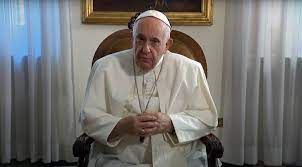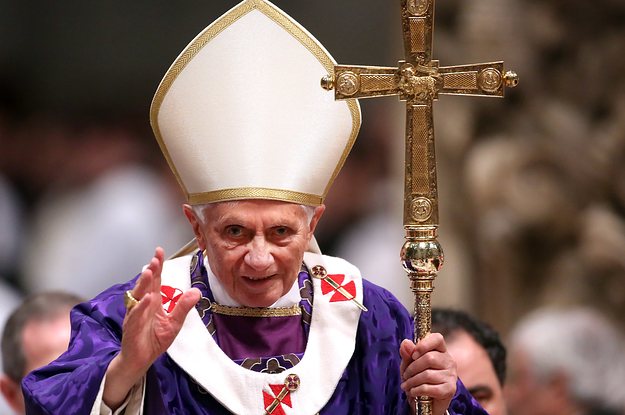
Pope Benedict XVI Has Died At 95


Pope Benedict XVI, the conservative German priest who served as the head of the Catholic Church for almost eight years before becoming the first pope in centuries to resign, has died. He was 95.
The Holy See Press Office announced that Benedict died at 9:34 a.m. on Dec. 31. On Jan. 2, the body of Benedict will be at St. Peter's Basilica so people can pay their respects. Vatican spokesperson Matteo Bruni said that Pope Francis will preside over Benedict's funeral Jan. 5 in St. Peter's Square.
Pope Francis@PontifexTwitter: @PontifexLet us #PrayTogether for Pope Emeritus Benedict who is supporting the Church in silence. Let us ask the Lord to console him and to sustain him in this witness of love for the Church, until the end.
12:30 PM - 28 Dec 2022Reply Retweet Favorite
Leading the Vatican between the papacies of two enormously popular men, Benedict, a shy introvert, never managed to enjoy the same cultural impact or public favor as the charismatic popes John Paul II and Francis.
The writings and encyclicals of Benedict, regarded as one of the foremost theologians of his generation, as pontiff were popular even among his critics, and he will undoubtedly be remembered as a “teaching pope” who worked to make doctrine accessible to all.
But his tenure as pope was rocky. Most notably, he was heavily criticized for the Vatican’s handling of child sex abuse committed by priests. He also struggled to reconcile a fundamentalist interpretation of church teachings with an increasingly vocal subset of Catholics advocating for LGBTQ rights and a more nuanced stance on contraception and abortion rights.
The infamous “Vatileaks” scandal, wherein the pope’s own butler leaked correspondence showing a Holy See plagued by infighting and jealousy, also came to symbolize a church in disarray.
Benedict will be best remembered, though, for his shocking decision to resign from the papacy in 2013 because of his age, having concluded that he lacked the “strength of mind and body” necessary to continue in the role. Assuming the new title of pope emeritus, Benedict became the first pontiff since the 13th century to relinquish the papacy without external pressure.
Born Joseph Aloisius Ratzinger in the Bavarian city of Marktl, Germany, on April 16, 1927, Benedict was the third and youngest child of Joseph and Maria Ratzinger. His parents met through a singles ad his father placed in a Catholic newspaper in July 1920, something that Benedict did not learn until an official visit to Germany as pope in 2006.
Benedict grew up in the village of Traunstein, near the Austrian border, where his father worked as a police officer. His adolescence was marked by the rise of Nazism; like all young Germans, he was required to join the Hitler Youth, but said he always looked for reasons to avoid meetings. Benedict later said that he remembered seeing his parish priests being beaten by Nazis before Mass.Benedict in 1943 as a German air force assistant
In September 1944, Benedict was conscripted into an auxiliary anti-aircraft corps outside of Munich. On April 16, 1945, his 18th birthday, he was forced into basic training but deserted the army a few weeks later. He was captured by Allied forces on his way home and taken to a POW camp outside Ulm, where he was held until June 19.
Following the end of World War II, Benedict completed his studies at his hometown seminary and set his eyes on higher education. From 1946 to 1951, he studied philosophy and theology at the Higher School of Philosophy and Theology of Freising and at the University of Munich.
Benedict and his brother, Georg, were ordained as priests June 29, 1951. Soon after he joined the priesthood, Benedict was appointed a lecturer in the archdiocesan seminary in Freising, a position he held while working on his doctoral dissertation. He received his doctorate in theology from the University of Munich in July 1953.
The next 20 years of Benedict’s life would be defined by his role as a teacher of the Catholic faith. During these years, Benedict’s scholarship attracted the notice of church leaders. In 1962, Cardinal Joseph Frings of Cologne asked him to serve as his adviser for the four sessions of the Second Vatican Council. For the next three years, until the council concluded in December 1965, he was highly influential behind the scenes of Vatican II, drafting documents, writing many of Frings’s speeches, and organizing the German coalition of bishops.
Benedict was named archbishop of Munich and Freising by Pope Paul VI on March 24, 1977. Three months later, he was elevated to the College of Cardinals. In August 1978, he was part of the conclave that elected John Paul I, who would serve as pope for 33 days before his death. Two months later, on Oct. 16, Benedict and the other members of the College of Cardinals elected John Paul II, who would go on to become one of the most well-known and beloved popes in the history of the Catholic Church.
In 1981, Pope John Paul II appointed Benedict the prefect of the Congregation for the Doctrine of the Faith (CDF). The modern CDF is a descendant of the Holy Inquisition and is responsible for promoting and preserving church doctrine. One of the organization’s primary roles is to rule whether writings and actions are theologically and morally consistent with church doctrine.
As head of the CDF, Benedict earned the nickname “God’s Rottweiler” for the fervor in which he championed the conservative wing of the church. His tenure was characterized by a widespread stifling of theologians and scholars whose understanding of Catholicism was outside the boundaries of his own interpretation. In particular, he cracked down on “liberation theology,” a movement started in Latin America that calls for embracing the poor and actively engaging in social justice and economic reform. Benedict’s publications as head of the CDF doubled down on the church’s conservative stances on LGBTQ issues, religious pluralism, bioethical issues (particularly abortion and contraception), secularization, and many other “social” issues. Those who dared to argue were disciplined, dismissed, and even excommunicated.
Paolo Cocco / AFP / Getty ImagesPope John Paul II waves to cardinals and bishops at the Vatican in 2003 as then-cardinal Joseph Ratzinger looks on.
In 2002, he was named dean of the College of Cardinals, a position he held until he was elected pope. Following the death of Pope John Paul II on April 2, 2005, Benedict, who had been the former pope’s right-hand man, was responsible for calling the conclave to elect the new leader of the Catholic Church.
Post
| By | ChasingMe |
| Added | Jan 11 '2023, 23:45 |
Rate
Archives
- All
- March 2023
- January 2023
- October 2022
- September 2022
- August 2022
- August 2022
- June 2022
- June 2022
- June 2022
- June 2022
- June 2022
- June 2022
- June 2022
- July 2021
- May 2021
- May 2021
- January 2021
- January 2021
- January 2021
- December 2020
- December 2020
- December 2020
- December 2020
- November 2020
- November 2020
- October 2020
- October 2020
- September 2020
- September 2020
- September 2020
- September 2020
- September 2020
- September 2020
- September 2020
- September 2020
- September 2020
- July 2020
- July 2020
- April 2020
- August 2018
- January 2018
- November 2017
- September 2017
- March 2017
- February 2017
- January 2017
- October 2016
- May 2016
- March 2016
- March 2016
- January 2016
- November 2015
- November 2015
- November 2015
- November 2015
- October 2015
- June 2015

